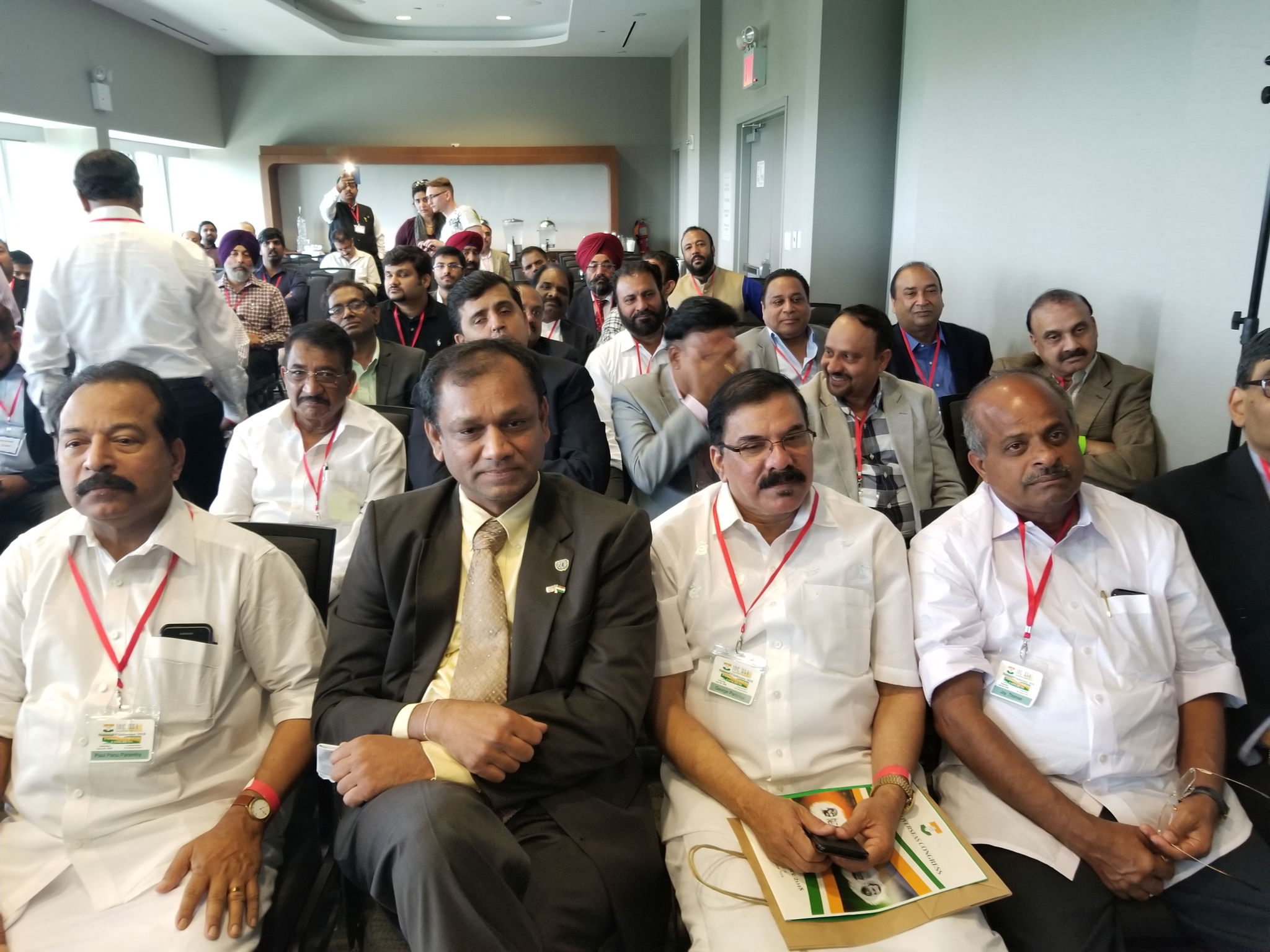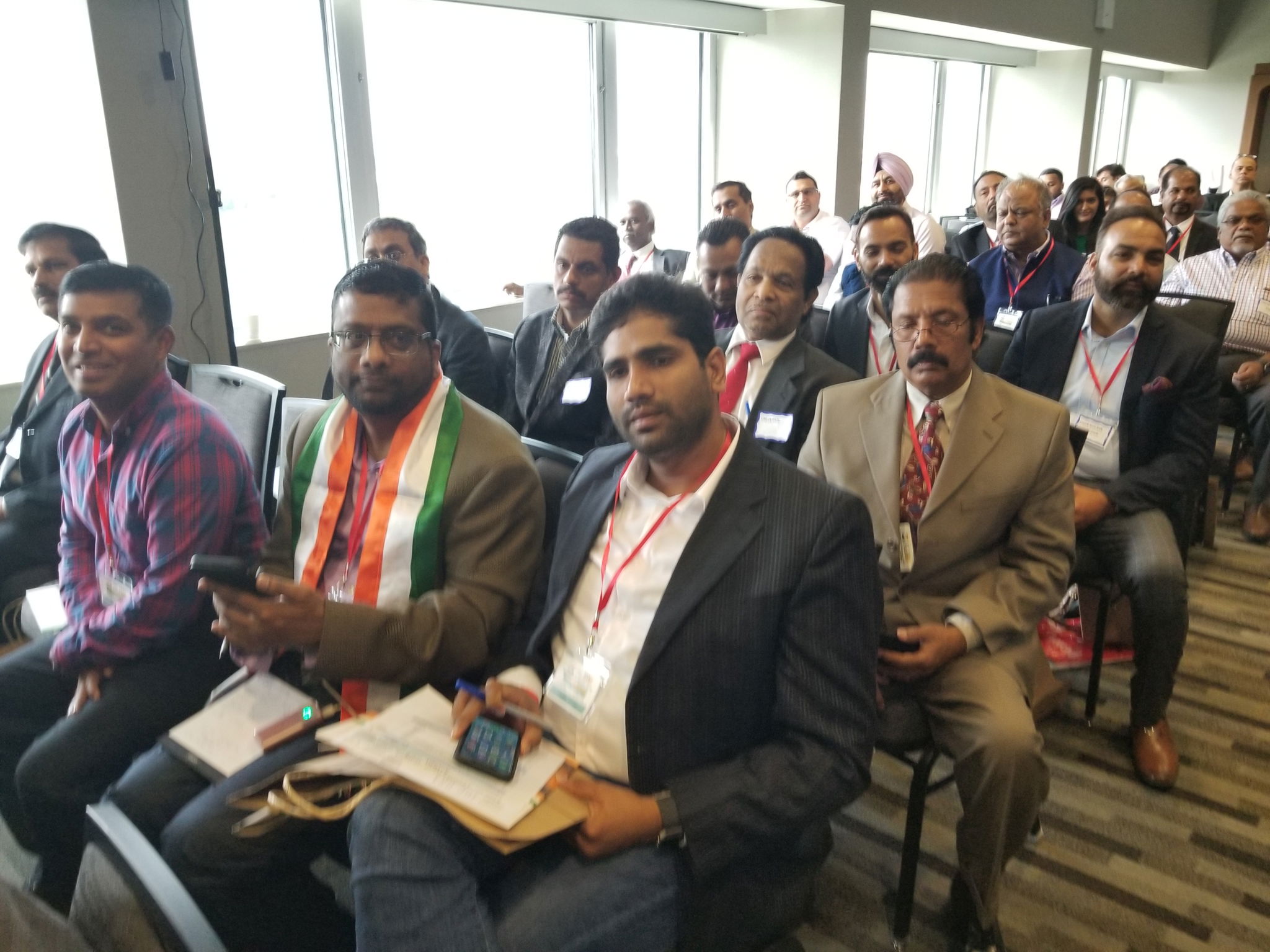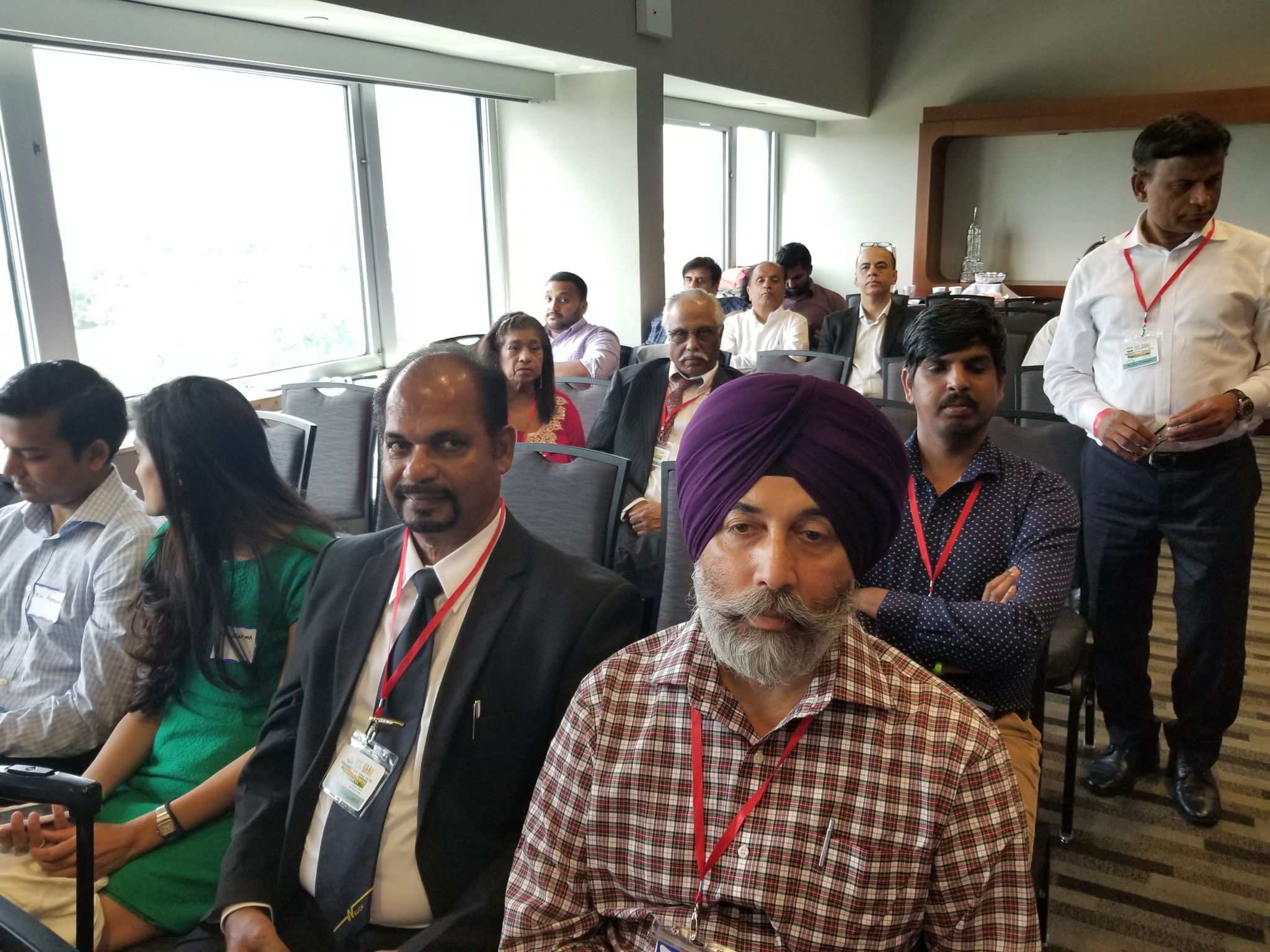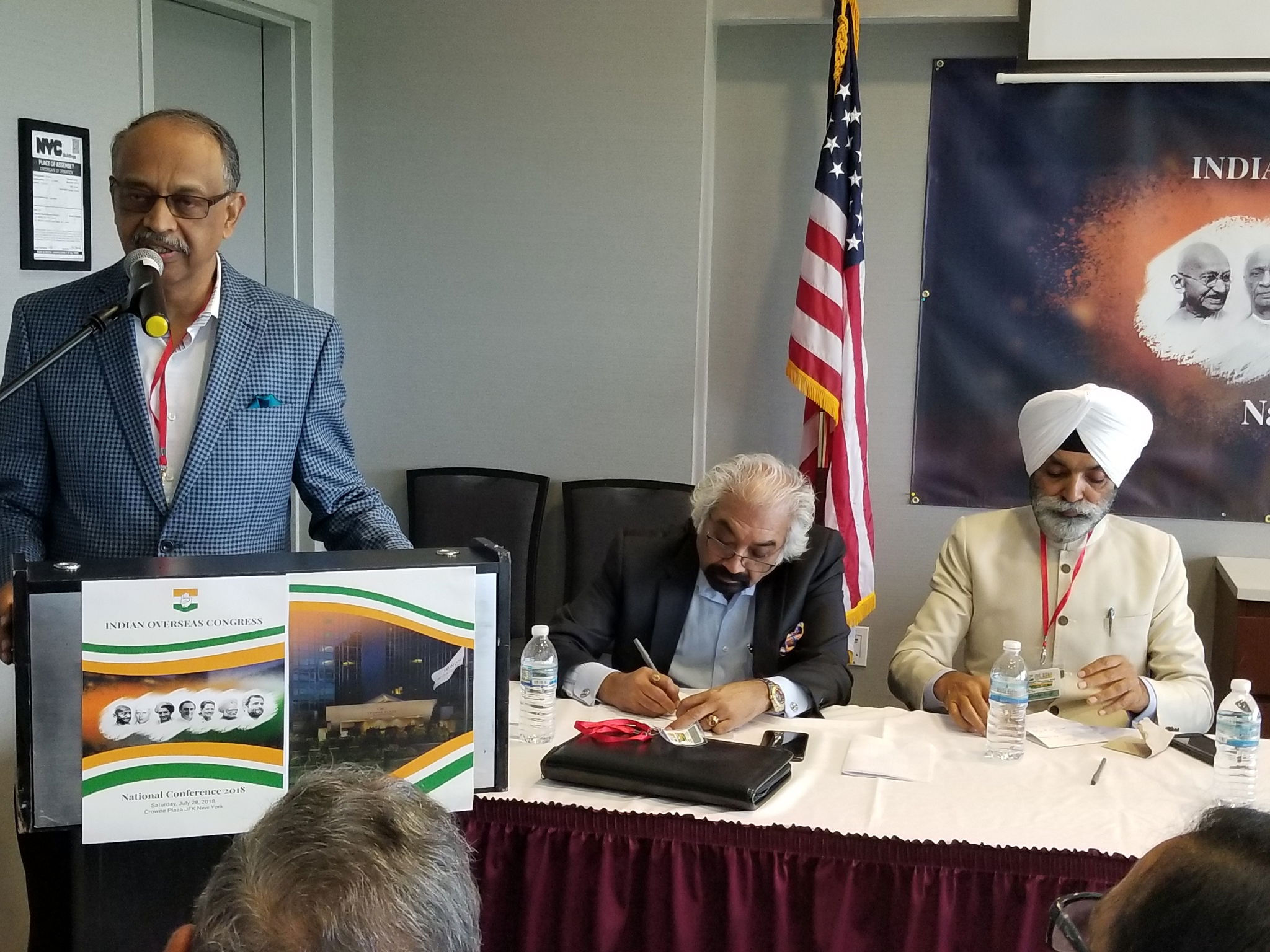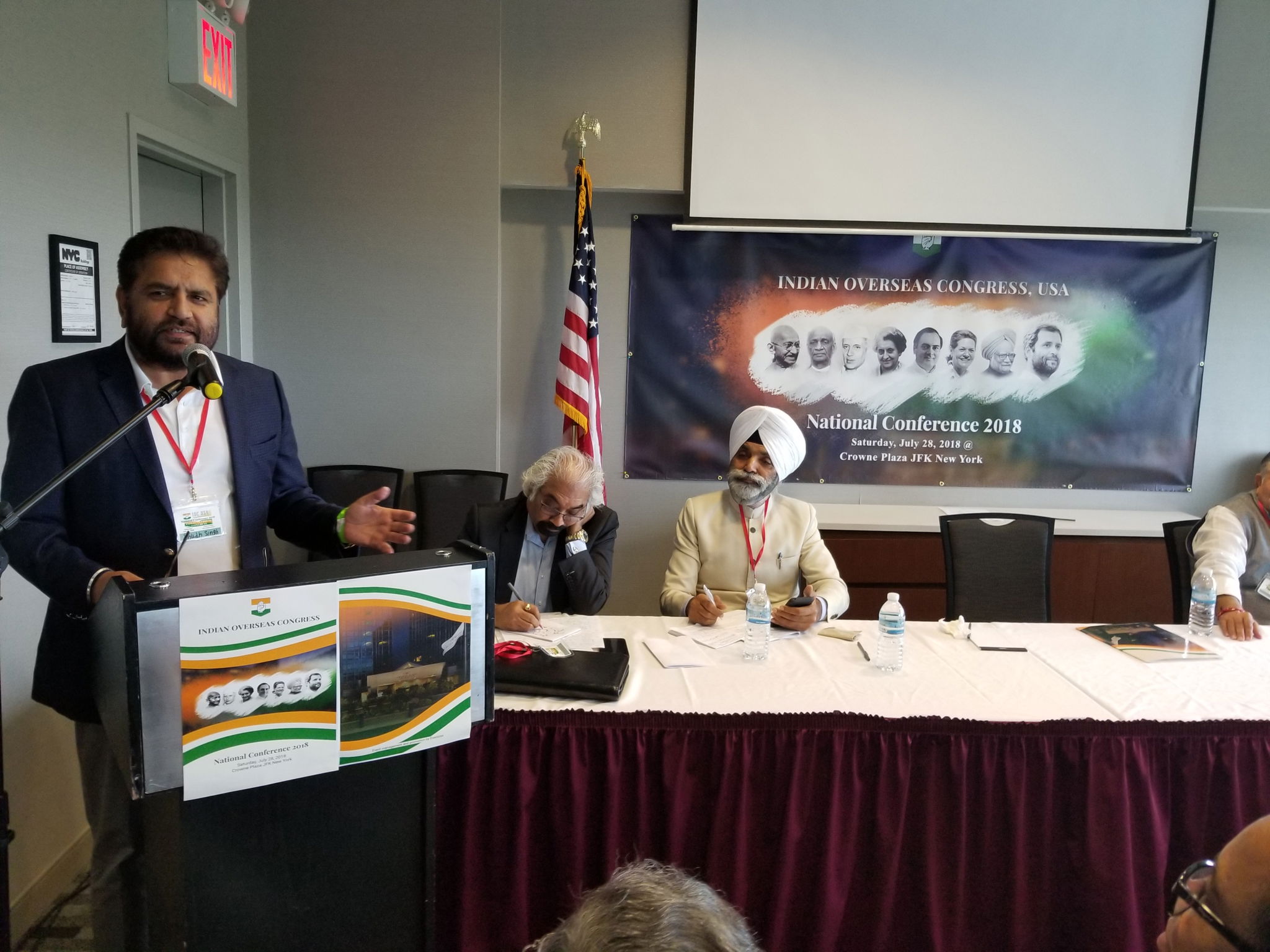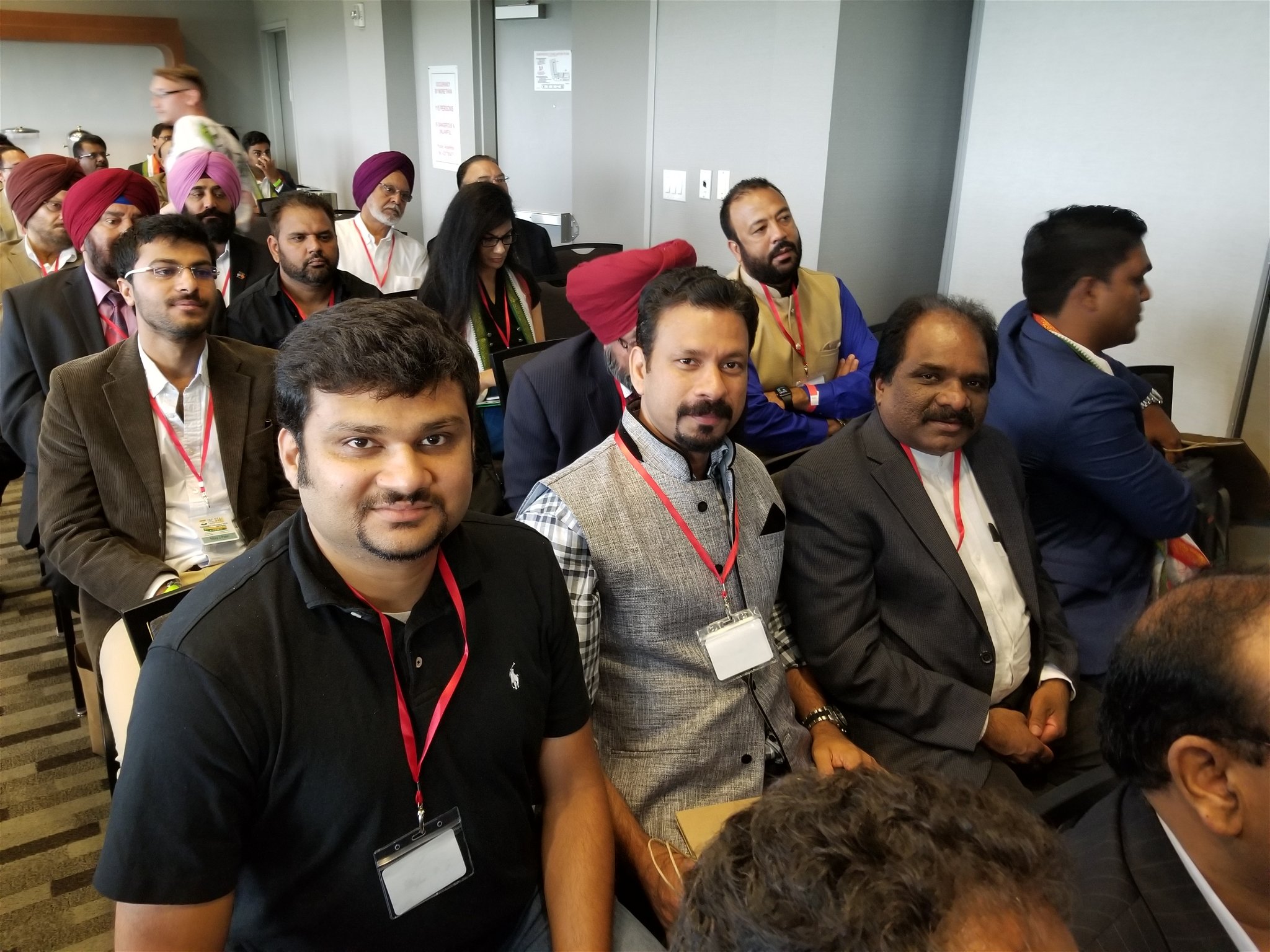America
Congress factions in the US to drop differences, work together

The American wing of the Indian National Congress, long riven into factions, has taken some major steps towards unity.
Sam Pitroda, chair of the non-resident Indians section of the party, encouraged Congress supporters to drop their differences to ensure the party did well in the upcoming parliamentary election in India. A meeting led by Pitroda was organized for this at the Crowne Plaza in Queens, New York, July 28.
Though the effort was far from an unqualified success, attendees agreed that coming together could help the party achieve the immediate goal of fighting the election.
In his remarkable speech Pitroda said conditions were grave in India and that NRIs could play a major role in organizing united action against the ruling party there.
Pitroda said that while he had not been active in politics, he changed his mind after seeing the situation in India.
He said there was no point fighting each other in the US. ‘Unless we can end personality conflicts, we are not part of the Congress,†he said. ‘Congress’s culture is to sort out differences. Those who escalate differences are incapable of being part of the Congress. Leadership is all about work, not about the chair.â€
He noted that the party, which has a presence in 18 countries, needs more chapters and at least ten thousand active members in America.
Pitroda also addressed the big issue that caused heartache when he said that he had heard people often saying that somebody humiliated him in the party. ‘Nobody can humiliate one unless he allows it.’
After repeated calls for unity from a variety of speakers, a few subcommittees were formed to help the election campaign.
The main speakers at the event included Dr. Surinder Malhotra, former president of the Indian National Overseas Congress (INOC), George Abraham, vice chair of the Indian Overseas Congress led by Pitroda, Shudh Parkash Singh, president INOC (I), Mohinder Singh Gilzian, president of the INOC, USA.
Though the meeting did not achieve the goal of unity, it was a welcome move to end the unnecessary infighting, many attendees said.
The factions originally emerged after George Abraham was replaced with Shudh Parkash Singh as president of the Indian National Overseas Congress (INOC) by Dr. Karan Singh, who was the head of the NRI Cell.
It was revealed that the two factions will remain as they were until the general elections are over but would work together under Pitroda. It meant unity is achieved at the top level, leaving the members to remain loyal to the groups.
Others who spoke at the event and called for unity included Rajender Dichappally, general secretary, INOC (I); Harbachan Singh, general secretary INOC, USA; Madhu Yaski, secretary of the All India Congress Committee (AICC); Himanshu Vyas, secretary for AICC; and Tavishi Alagh, AICC’s media coordinator.
When contacted the members after the meeting, some questioned the style of the functioning of Pitroda and the way he conducted the meeting. They said it was utter chaos and no decision was taken, even though the meeting was called for uniting the groups.
Subcommittees were formed instantly without giving representation to the long time workers.
Instead of focusing on unity, the speeches drifted on unnecessary subjects and some focused on sycophancy.
At the end, the groups will remain as earlier till the elections are over next year, they pointed out. A little more focus on unity would have made a different outcome, they said.
In his speech, Pitroda went on to describe the changes happening in India. He said he was inspired by freedom fighters in the Congress like Mahatama Gandhi, Vallabhbhai Patel, Jawaharlal Nehru, Maulana Azad and others.
‘They taught us that truth is important and also that we must trust others. Some may stab you from the back. Yet you cannot assume things about others. No person is bad.â€
In the present India, truth is being challenged and replaced with lies. He cited the example of the case of party newspaper National Herald. As a director, he is one of the accused. The case has been going on for years. Pitroda himself is out on bail in the case.
He said that under BJP rule many specious cases were being filed against Congress leaders.
In the National Herald case, he said that a penalty for 150 crore Rupees ($22 million) was imposed, while it had an annual turnover of 75 lakh rupees only ($102,000.)
‘We can go to the court to challenge the penalty. But as per law, we have to pay 20 percent of the amount before challenging it in court. We approached the media. But they are afraid to write against the government. They say that if they write anything against the government, the newspaper owners will face raids or other action.’
Pitroda said that industrialists are also afraid to help the party. ‘In the last 50 years many industries helped to raise funds for the Congress. But now they say that they cannot do much. If they help the Congress, there will be a raid.’
‘India as well as the world is at crossroads. Democracy is challenged everywhere,’ he noted.
Pitroda pointed out that the intimidation was not limited to supporters of opposition parties. ‘If you eat beef you are bad. If you celebrate Valentine’s Day, they will beat you. This is not the India we grew up in. It is also not the India we want.’
‘We believe in an inclusive India. In our younger days, nobody thought people belonging to other faiths or cultures were different. The beauty that is India is its diversity. When you attack diversity, you attack the idea of India. We propagate non violence while they propagate violence.’
Pitroda said that for the BJP, development is top down, helping only a few industrialists.
‘When the rural employment scheme was launched [in 2005, when the Congress was in power] many criticized it. But after a decade, we know it is the best thing that happened in India to fight poverty.’
He said he lived 54 years as an American but also as an Indian, and said it was time to speak up – both here in the US and back in India.
Having made the case for the urgency of change, Pitroda made his appeal for help for the immediate cause.
‘Since the general election next year is very important, NRIs can play a major role. We can go to India and join the campaign. But we have to earn the trust of the people first. Everybody can support a candidate from his native place,’ Pitroda said. He also called for using the digital platform.
Dr Malhotra spoke up for unity when he said that a Congress party member’s commitment is for life.
‘Disagreements are okay, but we have to work together. There is no room for fighting for chairs in the party.†he said.
Abraham, on his part, noted the origins of the INOC in 1998 by a few people including Zach Thomas and himself, and of its expansion once Dr Malhotra took the helm.
He went on to discuss the situation in India, saying that the institutions that made India succeed while other nations failed, were being systematically dismantled – law enforcement being turned into a weapon and the judiciary challenged.
He said that freedom of conscience is God-given and nobody could take it away.
Abraham said the media have become cheerleaders for the rulers. He said that independent thinking is being challenged with physical attacks, citing the killings of journalist Gouri Lankesh, rationalist Maheshappa Kalburgi and Communist Party of India leader Govind Pansare.
The students at Jawaharlal Nehru University were afraid even to organize a protest, because they feared being called anti-national.
He said it is the duty of Congress supporters everywhere to work to return India to the ideals of Gandhi and Nehru.
Shudh Parkash Singh, who noted the services of INOC leaders, laid out a plan for revitalizing the organization. He outlined the work done by the members.
According to Gilzian, ‘Our motherland’s secular existence is in danger because of the narrow thinking of the BJP, and the [Narendra] Modi government is finding different ways to put an end to our precious culture.
Mr. Himanshu Vyas, newly appointed Secretary to the Overseas
Congress Department of AICC spoke about building strong Overseas Congress
Chapters around the globe and asked the participants to communicate with him
for any extra help from his
Mr. Madhu Yaskhi, former Member of Parliament and AICC
Secretary Spoke about the challenges to Indian democracy and pointed out, in
particular, the corruption at the highest levels citing the Rafael Jet
purchasing case. He urged NRIs to get involved and bring about a change that is
essential for the survival of
Mr. Harbachan Singh, Secretary-General of the
Mr. Manoj Shinde presented an integrated IT plan for the organization and asked members to provide him with the content.
Ms. Tavishi Alagh, the Media Coordinator for Overseas
Congress Department of AICC, screened several videos at the conference showing
the history the Congress Party and fortitude of the past leaders of the freedom
struggle along with Mr. Rahul Gandhi’s vision for a more inclusive
In the ensuing discussions, delegates from all Chapters
spoke about the vision and missions of the organization and stressed the issue
of unity as a pre-requisite to moving forward in achieving set goals. T. J.
Gill, Malini Shah, John Joseph, Gurmit Singh Gill, Charan Singh, Phuman Singh,
Ravi Chopra, Thomas T. Oommen, Satish Sharma, R. Jayachandran, Zinda Singh,
Kulbir Singh Prempur Sarpanch, Sarvjit Singh, Prasad Kambapathy, Devendra Vora,
Girish Vaidya, Ajay Singh Lakhan, Santok Singh, Paul Sihota, Rana Gill, Jaya
Sundaram, Ram Gadula, Harkesh Thakur, Oommen Koshy, Chandu Patel, Santhosh
Nair, Rajesh Allahdad, Thomas Mathew, Krishan Arora, Leela Maret, Sawaran
Singh, Vishak Cherian, Paul Paramby, Ramesh Chandra, Nikhil G. Reddy, Saji
Karimpannuur, Rajan Padavathil, Mr. Sravanth Poreddy, Krishna Chaithanya and
Anil Patel, Dr. Mohammed Jameel, , Dr. Enu Karuvathu, Joy Thomas, Saji Abraham,
Madhu Erugu, Raj Boda, Rajeev Mohanan also participated in the discussions.
Delegates from various States including
A copy of the constitution was presented to the meeting by Mr. Harbachan Singh who is the main architect behind that effort. The document was referred to Sanjay Dubey Esq to resolve various legal questions concerning that within the next two weeks.
The meeting also appointed committee Chairpersons for Finance, Membership, Youth group, Women’s group, IT group, Social Media etc. and a detailed list will be published soon.
The program was conducted by Eventzter group




